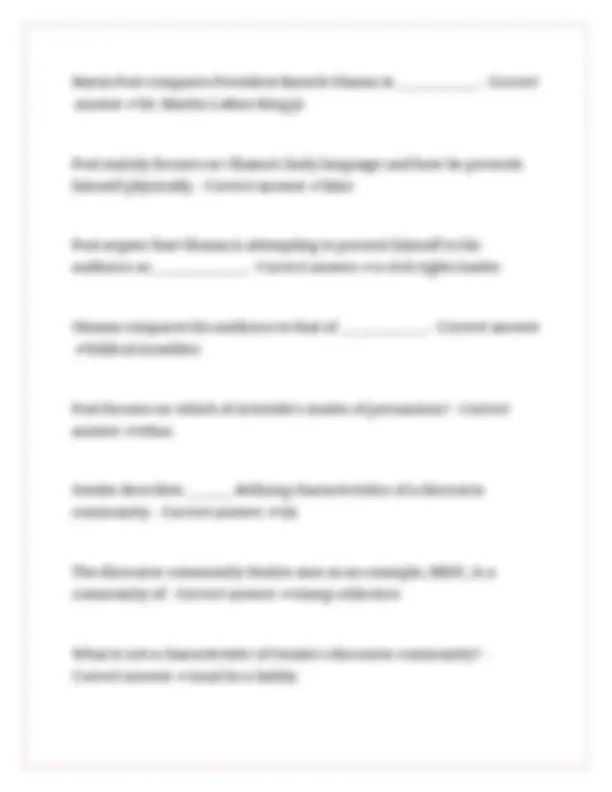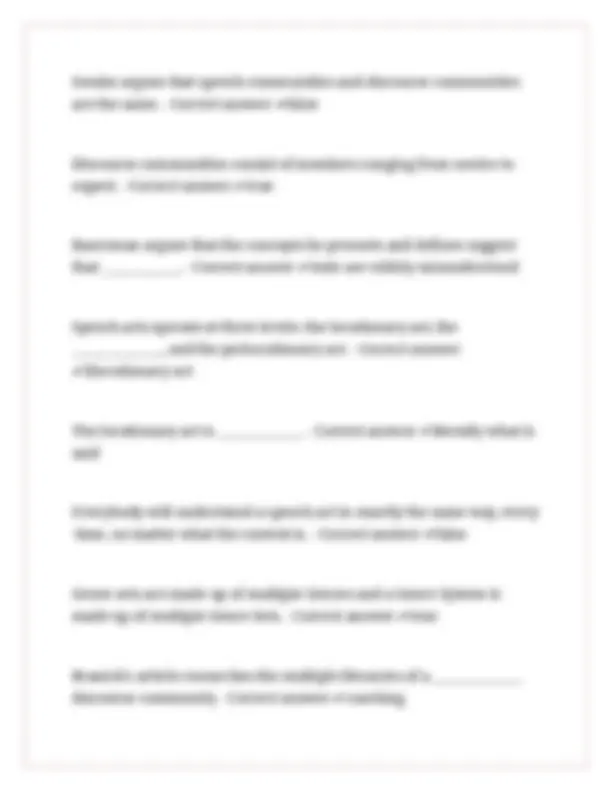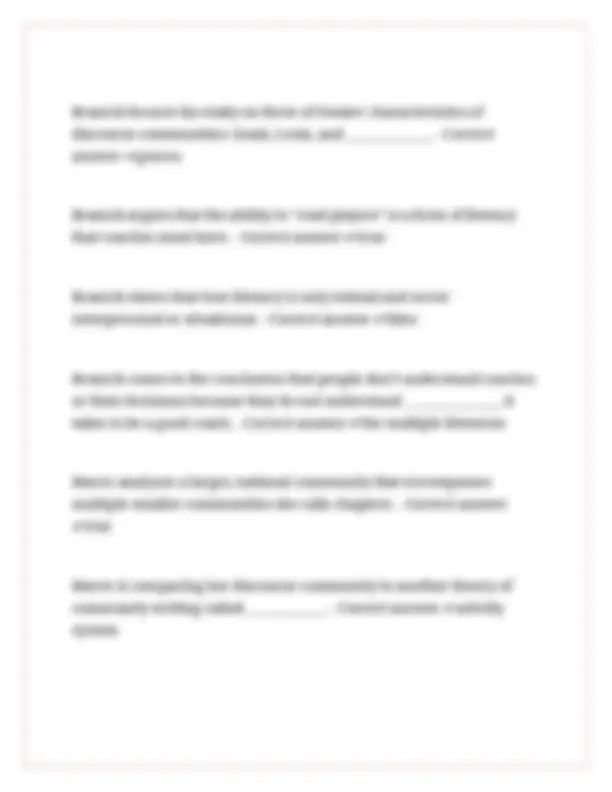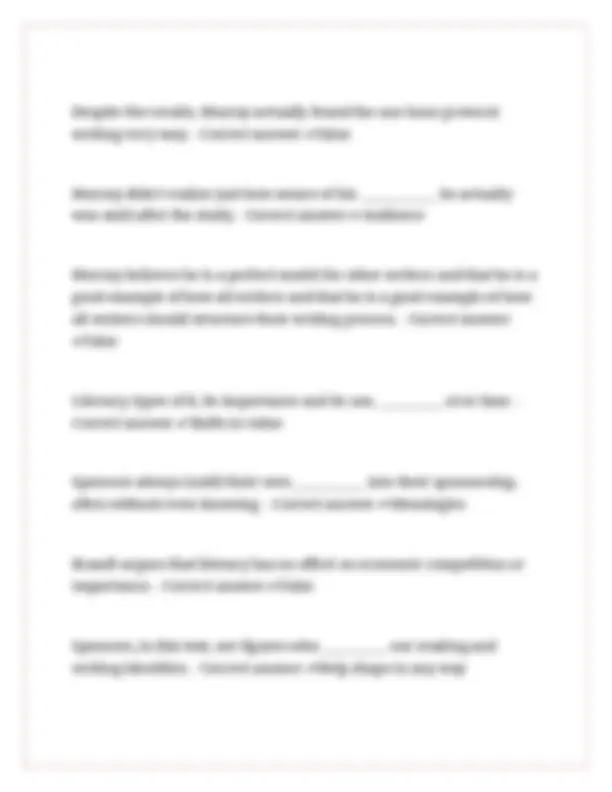







Study with the several resources on Docsity

Earn points by helping other students or get them with a premium plan


Prepare for your exams
Study with the several resources on Docsity

Earn points to download
Earn points by helping other students or get them with a premium plan
Community
Ask the community for help and clear up your study doubts
Discover the best universities in your country according to Docsity users
Free resources
Download our free guides on studying techniques, anxiety management strategies, and thesis advice from Docsity tutors
ENC 1101 Exam Review questions with precise answers
Typology: Exams
1 / 9

This page cannot be seen from the preview
Don't miss anything!






Fishman's [!] article [!] is [!] primarily [!] focused [!] on [!] describing [!] ________ [!] of [!] the [!] young [!] Amish [!] boy, [!] Eli [!] Jr. [!] - [!] Correct [!] answer [!] ✔literacy [!] activities According [!] to [!] the [!] Amish [!] religion [!] and [!] Fishman's [!] article, [!] a [!] typical [!] Amish [!] only [!] reads [!] and [!] never [!] writes. [!] - [!] Correct [!] answer [!] ✔false Fishman [!] shows [!] that [!] literacy [!] is [!] a [!] ___________ [!] that [!] imparts [!] _____________. [!] - [!] Correct [!] answer [!] ✔force [!] / [!] power Fishman [!] claims [!] that [!] there [!] is [!] a [!] difference [!] between [!] __________ [!] literacy [!] and [!] Amish [!] literacy. [!] - [!] Correct [!] answer [!] ✔mainstream Fishman [!] argues [!] that [!] there [!] are [!] issues [!] with [!] how [!] we [!] typically [!] view [!] and [!] understand [!] what [!] literacy [!] is. [!] - [!] Correct [!] answer [!] ✔true Lamott [!] wrote [!] ________ [!] and [!] uses [!] this [!] as [!] an [!] example [!] of [!] her [!] own [!] writing [!] method [!] in [!] her [!] essay. [!] - [!] Correct [!] answer [!] ✔food [!] reviews
Lamott [!] argues [!] that [!] your [!] first [!] draft [!] should [!] be [!] perfect. [!] - [!] Correct [!] answer [!] ✔false Lamott [!] calls [!] first [!] drafts [!] a [!] ___________, [!] in [!] which [!] you [!] let [!] loose [!] and [!] write [!] freely. [!] - [!] Correct [!] answer [!] ✔child's [!] draft Lamott [!] discusses [!] ________________ [!] that [!] might [!] create [!] anxiety [!] about [!] writing [!] a [!] rough [!] draft. [!] - [!] Correct [!] answer [!] ✔voices [!] in [!] our [!] head The [!] first [!] draft [!] of [!] your [!] Project [!] 1 [!] is [!] going [!] to [!] be [!] shitty. [!] - [!] Correct [!] answer [!] ✔Yep, [!] and [!] that's [!] okay! According [!] to [!] Wardle [!] and [!] Downs, [!] Rhetoric [!] refers [!] to [!] only [!] the [!] art [!] of [!] human [!] interaction [!] and [!] not [!] the [!] study [!] of [!] it. [!] - [!] Correct [!] answer [!] ✔false A [!] rhetor [!] is [!] someone [!] interacting [!] with [!] other [!] people, [!] a [!] __________ [!] is [!] a [!] person [!] who [!] is [!] being [!] interacted [!] with. [!] - [!] Correct [!] answer [!] ✔interlocutor Activities [!] that [!] create [!] new [!] knowledge [!] are [!] called [!] ___________. [!] - [!] Correct [!] answer [!] ✔epistemic The [!] vast [!] majority [!] of [!] texts, [!] if [!] not [!] all, [!] are [!] motivated [!] by [!] some [!] purpose, [!] needs, [!] or [!] values. [!] - [!] Correct [!] answer [!] ✔true
Swales [!] argues [!] that [!] speech [!] communities [!] and [!] discourse [!] communities [!] are [!] the [!] same. [!] - [!] Correct [!] answer [!] ✔false Discourse [!] communities [!] consist [!] of [!] members [!] ranging [!] from [!] novice [!] to [!] expert. [!] - [!] Correct [!] answer [!] ✔true Bazerman [!] argues [!] that [!] the [!] concepts [!] he [!] presents [!] and [!] defines [!] suggest [!] that [!] ____________. [!] - [!] Correct [!] answer [!] ✔texts [!] are [!] widely [!] misunderstood Speech [!] acts [!] operate [!] at [!] three [!] levels: [!] the [!] locutionary [!] act, [!] the [!] ______________, [!] and [!] the [!] perlocutionary [!] act. [!] - [!] Correct [!] answer [!] ✔illocutionary [!] act The [!] locutionary [!] act [!] is [!] _____________. [!] - [!] Correct [!] answer [!] ✔literally [!] what [!] is [!] said Everybody [!] will [!] understand [!] a [!] speech [!] act [!] in [!] exactly [!] the [!] same [!] way, [!] every [!] time, [!] no [!] matter [!] what [!] the [!] context [!] is. [!] - [!] Correct [!] answer [!] ✔false Genre [!] sets [!] are [!] made [!] up [!] of [!] multiple [!] Genres [!] and [!] a [!] Genre [!] System [!] is [!] made [!] up [!] of [!] multiple [!] Genre [!] Sets. [!] - [!] Correct [!] answer [!] ✔true Branick's [!] article [!] researches [!] the [!] multiple [!] literacies [!] of [!] a [!] ______________ [!] discourse [!] community. [!] - [!] Correct [!] answer [!] ✔coaching
Branick [!] focuses [!] his [!] study [!] on [!] three [!] of [!] Swales' [!] characteristics [!] of [!] discourse [!] communities: [!] Goals, [!] Lexis, [!] and [!] _____________. [!] - [!] Correct [!] answer [!] ✔genres Branick [!] argues [!] that [!] the [!] ability [!] to [!] "read [!] players" [!] is [!] a [!] form [!] of [!] literacy [!] that [!] coaches [!] must [!] have. [!] - [!] Correct [!] answer [!] ✔true Branick [!] shows [!] that [!] true [!] literacy [!] is [!] only [!] textual [!] and [!] never [!] interpersonal [!] or [!] situational. [!] - [!] Correct [!] answer [!] ✔false Branick [!] comes [!] to [!] the [!] conclusion [!] that [!] people [!] don't [!] understand [!] coaches [!] or [!] their [!] decisions [!] because [!] they [!] do [!] not [!] understand [!] _______________ [!] it [!] takes [!] to [!] be [!] a [!] good [!] coach. [!] - [!] Correct [!] answer [!] ✔the [!] multiple [!] literacies Marro [!] analyzes [!] a [!] larger, [!] national [!] community [!] that [!] encompasses [!] multiple [!] smaller [!] communities [!] she [!] calls [!] chapters. [!] - [!] Correct [!] answer [!] ✔true Marro [!] is [!] comparing [!] her [!] discourse [!] community [!] to [!] another [!] theory [!] of [!] community [!] writing [!] called [!] ____________. [!] - [!] Correct [!] answer [!] ✔activity [!] system
Rose [!] argues [!] that [!] success [!] plans [!] include [!] feedback. [!] - [!] Correct [!] answer [!] ✔True Rose [!] is [!] comparing [!] the [!] writing [!] process [!] to [!] that [!] of [!] ____________. [!] - [!] Correct [!] answer [!] ✔Problem [!] solving Rose [!] argues [!] that [!] from [!] the [!] start [!] plans [!] made [!] before [!] writing [!] should [!] be [!] inflexible [!] and [!] set [!] in [!] stone [!] for [!] every [!] assign [!] assignment. [!] - [!] Correct [!] answer [!] ✔False The [!] non-blockers' [!] planning [!] and [!] writing [!] is [!] _____________. [!] - [!] Correct [!] answer [!] ✔Fluid [!] and [!] free During [!] the [!] one-hour [!] writing, [!] Murray [!] was [!] able [!] to [!] write [!] a [!] particular [!] well [!] thought [!] out [!] and [!] poignant [!] piece. [!] - [!] Correct [!] answer [!] ✔False Barkenkotter [!] noticed [!] that [!] Murray [!] often [!] combined [!] the [!] activities [!] of [!] planning [!] and [!] revising [!] into [!] a [!] new [!] activity [!] that [!] she [!] calls [!] __________. [!] - [!] Correct [!] answer [!] ✔Reconceiving Contrary [!] to [!] what [!] Murray [!] believed, [!] Berkenkotter [!] found [!] that [!] both [!] external [!] and [!] internal [!] ____________ [!] were [!] affected [!] by [!] the [!] consideration [!] of [!] the [!] audience. [!] - [!] Correct [!] answer [!] ✔Revision
Despite [!] the [!] results, [!] Murray [!] actually [!] found [!] the [!] one-hour [!] protocol [!] writing [!] very [!] easy. [!] - [!] Correct [!] answer [!] ✔False Murray [!] didn't [!] realize [!] just [!] how [!] aware [!] of [!] his [!] ____________ [!] he [!] actually [!] was [!] until [!] after [!] the [!] study. [!] - [!] Correct [!] answer [!] ✔Audience Murray [!] believes [!] he [!] is [!] a [!] perfect [!] model [!] for [!] other [!] writers [!] and [!] that [!] he [!] is [!] a [!] good [!] example [!] of [!] how [!] all [!] writers [!] and [!] that [!] he [!] is [!] a [!] good [!] example [!] of [!] how [!] all [!] writers [!] should [!] structure [!] their [!] writing [!] process. [!] - [!] Correct [!] answer [!] ✔False Literacy, [!] types [!] of [!] it, [!] its [!] importance [!] and [!] its [!] use, [!] __________ [!] over [!] time. [!] - [!] Correct [!] answer [!] ✔Shifts [!] in [!] value Sponsors [!] always [!] instill [!] their [!] own [!] ___________ [!] into [!] their [!] sponsorship, [!] often [!] without [!] even [!] knowing. [!] - [!] Correct [!] answer [!] ✔Ideaologies Brandt [!] argues [!] that [!] literacy [!] has [!] no [!] effect [!] on [!] economic [!] competition [!] or [!] importance. [!] - [!] Correct [!] answer [!] ✔False Sponsors, [!] in [!] this [!] text, [!] are [!] figures [!] who [!] __________ [!] our [!] reading [!] and [!] writing [!] identities. [!] - [!] Correct [!] answer [!] ✔Help [!] shape [!] in [!] any [!] way